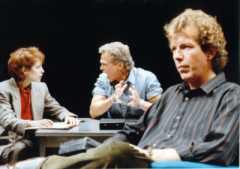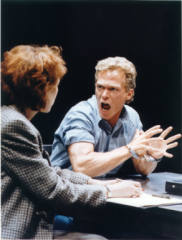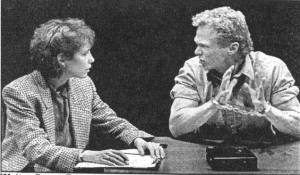 |
 |
| To Lobby | To Program |
 William Reach is serving a life sentence without
possibility of parole in a maximum-security prison in an
unnamed state. Reach enigmatically admits more than once
that he killed "at least 19" females including
one young, fifth-grade girl. And he argues they were
killings, not murders, because "murders have
motives."
William Reach is serving a life sentence without
possibility of parole in a maximum-security prison in an
unnamed state. Reach enigmatically admits more than once
that he killed "at least 19" females including
one young, fifth-grade girl. And he argues they were
killings, not murders, because "murders have
motives."  Taking up indefinite residence at a motel 10
miles from the prison are the husband-wife writing team
of Daniel and Iris Henniman, who will take turns
interviewing Reach for the definitive book on his life
and his victims' deaths. Iris is an experienced hand at
such work and is eager to get on with it. Daniel is an
experienced writer but a novice at the assignment he's
now undertaking, and he's leery of it.
Taking up indefinite residence at a motel 10
miles from the prison are the husband-wife writing team
of Daniel and Iris Henniman, who will take turns
interviewing Reach for the definitive book on his life
and his victims' deaths. Iris is an experienced hand at
such work and is eager to get on with it. Daniel is an
experienced writer but a novice at the assignment he's
now undertaking, and he's leery of it. They begin this exploration not just because of
Reach's swaggering evil but also because of the couple's
unseen publisher. He wants a book that will sell the
sensation, not address the dilemmas. As Reach visualizes
a title containing the word, "blood," the
publisher starts talking about going directly into
paperback and calling networks.
They begin this exploration not just because of
Reach's swaggering evil but also because of the couple's
unseen publisher. He wants a book that will sell the
sensation, not address the dilemmas. As Reach visualizes
a title containing the word, "blood," the
publisher starts talking about going directly into
paperback and calling networks.
What
Did James Say?
DB:
Actors are frequently called on to portray feelings and expressions for
which they have had no experience. For example, take the play, DOWN THE ROAD.
Your portrayal of serial killer William Reach's anger and intensity was
spell-binding.
How do you prepare yourself for these kind of roles, how do you maintain the
intensity and how do you get out of the role at the end of the day?
JM:
DOWN THE ROAD was being written as we rehearsed so everyday was an
adventure. We were literally being taken "down the road" by the story
and it was easy to surrender to the journey. The director, Des McAnuff, made it
as enjoyable a process as one could by showing us films, keeping it light
through the rehearsal days. He turned it into a learning process. A lesser
director wouldn't have done so. We explored an incompressible and heinous aspect
of human nature and it was rather enjoyable. That's not to say we _took_ it
lightly but we had to maintain a positive stance through what became a horrific
trip through the mind of a serial killer, or rather, several serial killers
since William Reach was a composite personality. As for "maintaining the
intensity," like everything else, if you saturate your imagination with the
task at hand, there is no room for anything else. The more intense or invasive
the subject matter is, of course, the easier it is but it's mainly a matter of
focus and willingness to submit. There's a period in the process where you
_don't_ get out of it. You think about the circumstances of the story and only
that because the more you do the more it means to you. (The more it means to
you, the more it means to someone watching you.) You live it and breathe it and
dream it. Then it relaxes into you - or you relax into it, or both - and you can
summon it at will (or it summons you). Once you've reached that saturation
point. And then you just do the job. At 8 o'clock you're there and at 10 you're
not.